Here you can find information for all past student bloggers and their interesting stories.
Sinenhlanhla Precious Sikhosana
The best thing about growing up in rural South Africa is the ability to explore your surroundings freely. The discoveries we made while searching for cattle in the veld ignited my inquisitive mind at a very young age. From then on, I knew that I wanted to be part of the teams that made groundbreaking discoveries.
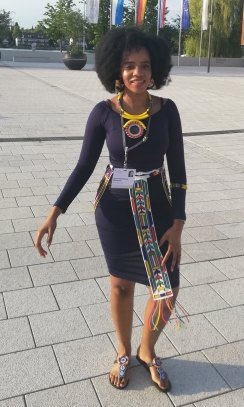
It was only in my matric year that I was exposed to the possibility of a career in astronomy in South Africa. The UKZN postgrad students passionately shared how they were trying to solve the mysteries of the universe; I was instantly sold. I am currently studying towards a PhD in applied mathematics with a research focus in astrophysics. For my project, we use radio telescopes such as the proudly South African MeerKAT telescope to study galaxy clusters, which are the most massive objects in the universe (1 000 000 000 000 00 times heavier than the mass of our sun!).
Throughout my academic career, I have struggled to find mentors or role models that I could fully relate with. This experience drove me to be vastly involved in educational outreach programs. I am now a member of the Astrophysics and Cosmology Research Unit’s (ACRU) outreach committee, and I work closely with UKZN’s college of agriculture, engineering and science public relations office. My hope is that even a girl from eXambu (my village) can dream of becoming an astronomer and realize this dream because they see their journey reflected in mine.
Richard Hay
Someone once told me that we can be characterised by what we empty out of our pockets at the end of every day. In my case it’s seeds, a habit I inherited from my grandfather.
I grew up on his farm outside Nelspruit in an incredibly sporty and adventurous household, and so have always been obsessed with natural spaces and the life that occupies them. I hold a BSc in applied plant and soil sciences from the University of Pretoria and am very much a self-professed agricultural science nerd, but my book collection still reflects a love for evolutionary biology, zoology, and ecology as well.
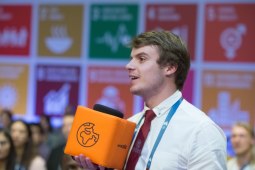
However, during my time in the university residences, I developed a passion for social justice and this has shaped my research focus. My work looks on how small-scale farmers use social media to form online communities and share information. Our goal now is to develop free online learning programmes for farmers, with the aim of increasing university-community engagement. I believe that all science should be open-access, and that we as scientists need to do more to ensure that the way we communicate our science is also understandable. One of my personal goals for 2020 is to be more active on social media under my handle @HaysHarvest, talking about the complexities of the global food system.
Pagiel Joshua Chetty
My name is Pagiel Joshua Chetty, a current Masters candidate at the University of Cape Town. I am currently working full time as an educator in one of Cape Town’s most prestigious schools, Rondebosch Boys Preparatory School. I am the youngest born in a family of five. I am happily married and have been blessed with one of the cutest son’s ever to be born in November.
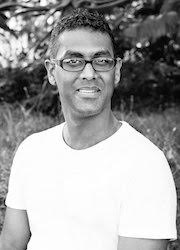
After matriculating in 2006 from Piet Retief High School, I decided to take a gap year (which turned into three years) as I was unsure of what I wanted to study. It was during this time that I was exposed to the noble profession of education and its positive effects in low income communities across South America. I returned to South Africa, armed with a ‘Paulo Freirean/Henry Girouxian’ vision of liberating the oppressed through a progressive and reformist pedagogy focused on the public good.
After completing my Bachelors of Education through UNISA, I was able to further my studies by enrolling for an Honours degree in Education Management, of which I graduated Cum Laude.
My research interests are education, policy studies, systemic injustice, the public good, and the effects of Neoliberalism and Capitalism on Education. These interests all stem from my lived experiences: being the first person of colour to be accepted as a student in my previously ‘white only’ primary school, being able to travel around the world exploring new cultures post-matric, and experiencing the education system in all its various forms and modes across South Africa and the World.
My desire is to make a valuable contribution in the education sector by being an upstanding and brave reformer who is focused on seeing the success of those who have been marginalized, forgotten, used and abused by an education system (sometimes willingly, other times unknowingly) that perpetrates injustice and inequality.
Kimberleigh Tommy
All parents tend to worry when their (usually noisy) children have mysteriously fallen quiet, my mother, however, always knew exactly what I was up to. She would find me in the same place every single time: the bathroom, standing over the sink, mixing together baby powder, lotions and anything else I could reach. “What are you doing”- she would ask. The answer pretty much has defined my life ever since, “I’m making an experiment mum”.
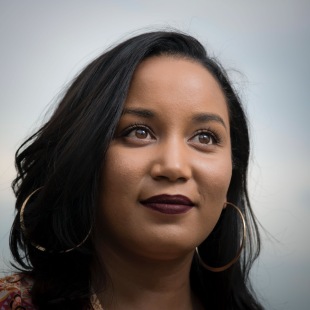
I grew up in Johannesburg and later attended the University of the Witwatersrand (WITS) where I quickly realized that my “experiments” were not going to concern mixing chemicals in a laboratory (because I was dismal at chemistry) but instead would focus on how evolution and adaptation experimented with body shape and why. I would later pursue my postgraduate studies in palaeoanthropology at WITS in order to gain a deeper understanding of one of the most successful evolutionary experiments of all time- how we came to walk on two legs, a characteristic that defines us.
I obtained my Master’s degree in 2018 with a distinction and no corrections (this is excluding the corrections from all 8736378 drafts my supervisors were kind enough to read through). I will soon be starting my PhD in Biological Anthropology through the Human Variation and Identification Research Unit (HVIRU) at the School of Anatomical Sciences, WITS University. I expect to be knee deep in research work for the next three years as I undertake a study of the knee joint (Get it? On the other hand, maybe I “kneed” better jokes. Again. Hahahaha!)
Sesetu Nyeleka
I am part of the fortunate percentage in the world that was born with a twin and two other sisters. I was born and bred in the Eastern Cape that is also where I did most of my schooling. In 2012 I enrolled for a Bachelor degree in Agricultural Extension at the University of Fort Hare. The plan was to get my degree, do Honours and be an adult and get a job. By the time 2016 came to an end I had fallen in love with listening to people’s (smallholder farmers in particular) perspectives about different farming issues. This happened while I was collecting data for my Honours project which was focusing on the importance of community radio in disseminating information to smallholder farmers. Listening to the smallholder farmers and the station managers made me realize how much science communication is an integral part of social and economic development.

After this experience, I decided I wanted a Master’s degree because I wanted to continue working with and learning from smallholder farmers. However, plans changed and for my Masters study I was focusing on the use of Indigenous Knowledge and its ability to improve household income and food security. For my PhD, I decided to go back to “my first love” working with smallholder farmers focusing on using Video-Integrated-Learning as a tool for improving extension approaches currently used to disseminate information to smallholder farmers.
Scientific communication done in an easy to understand manner is what I am passionate about. I enjoy communicating whether it is through pen and paper, video or simple face to face communication. I believe the future of building effective scientific solutions that are acceptable to community’s lies in well-constructed communication channels.
Joyful Elma Mdhluli
I am Joyful Elma Mdhluli, the 4th of five children in my family and currently the only one to have made it to University.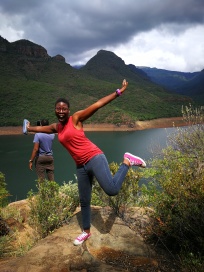 Born and raised in Bushbuckridge Mpumalanga, I relocated at age 11 to a small little town called Kampersrus. Completed my Primary school at Laerskool Mariepskop and matriculated in 2010 from Merensky High School. I completed my undergraduate degree, Honours and Masters by distinction from the University of the Witwatersrand. I am currently a Doctoral candidate at the University of the Witwatersrand under the School of Physics. Truth be told, I didn’t know I wanted to be a Physicist until I started doing my Masters degree.
Born and raised in Bushbuckridge Mpumalanga, I relocated at age 11 to a small little town called Kampersrus. Completed my Primary school at Laerskool Mariepskop and matriculated in 2010 from Merensky High School. I completed my undergraduate degree, Honours and Masters by distinction from the University of the Witwatersrand. I am currently a Doctoral candidate at the University of the Witwatersrand under the School of Physics. Truth be told, I didn’t know I wanted to be a Physicist until I started doing my Masters degree.
I enjoy travelling (which is great for me because I get to do a lot of that currently), trying new things and meeting new people. I am a generally happy person. My favourite physics equation is the Heisenberg Uncertainty Principle, I may be uncertain about a lot of things in my life but I’m definitely certain about the love I have for physics. The plan is to stay in academia and inspire more young female students to pursue a career not only in Physics (or STEM) but in academia as well.
Munira Hoosain
Growing up, I was fascinated with nearly everything and immediately knew I wanted to be a scientist. It took a bit of experimentation, doing physics and a bit of environmental science before I fell in love with astronomy.  It offered the perfect balance between mathematics and theory and observing the natural world. I majored in Astronomy and Physics at the University of Cape Town for my undergraduate degree and completed my Honours through the National Astrophysics and Space Sciences Programme. I am beginning my MSc in Astronomy, with a focus on extragalactic astronomy. Alongside my science, I am passionate about social justice and the role of science in development.
It offered the perfect balance between mathematics and theory and observing the natural world. I majored in Astronomy and Physics at the University of Cape Town for my undergraduate degree and completed my Honours through the National Astrophysics and Space Sciences Programme. I am beginning my MSc in Astronomy, with a focus on extragalactic astronomy. Alongside my science, I am passionate about social justice and the role of science in development.
Luthando Tshwenya
I was born and bred in the second biggest township in South Africa, Mdantsane. Out of  the 4 siblings I have I am the only one who has managed to pass matric and go to varsity; I believe this has been the driving force behind my many achievements in academia, besides umama (my mother). I’m a Scientist by profession, but the relationship between Chemistry and I was not “love at first sight” … it was the kind of connection that has grown over time due to mistakes made, attention and commitment. A kind of relationship that has helped open many doors, helped me to grow. Chemistry and academia have open my mind to countless possibilities and inspired me to chase after the importance of giving back. It was after my in-service training at a routine laboratory that I decided I want to be a real scientist/researcher. After obtaining my BTech from Walter Sisulu University, I joined the University of Johannesburg’s Department of Applied Chemistry where I did my Masters in the area of water treatment and nanotechnology. I am now a PhD candidate in the same department working with ionic diodes for possible water desalination in collaboration with the University of Bath (United Kingdom), where I spent 3 months learning about the ionic diode principle. It was the time I spent in the United Kingdom I got motivated to join the SAYAS blog team.
the 4 siblings I have I am the only one who has managed to pass matric and go to varsity; I believe this has been the driving force behind my many achievements in academia, besides umama (my mother). I’m a Scientist by profession, but the relationship between Chemistry and I was not “love at first sight” … it was the kind of connection that has grown over time due to mistakes made, attention and commitment. A kind of relationship that has helped open many doors, helped me to grow. Chemistry and academia have open my mind to countless possibilities and inspired me to chase after the importance of giving back. It was after my in-service training at a routine laboratory that I decided I want to be a real scientist/researcher. After obtaining my BTech from Walter Sisulu University, I joined the University of Johannesburg’s Department of Applied Chemistry where I did my Masters in the area of water treatment and nanotechnology. I am now a PhD candidate in the same department working with ionic diodes for possible water desalination in collaboration with the University of Bath (United Kingdom), where I spent 3 months learning about the ionic diode principle. It was the time I spent in the United Kingdom I got motivated to join the SAYAS blog team.
Mamothena Mothupi
I am a South African dividing my time between Cape Town (South Africa) and Nairobi 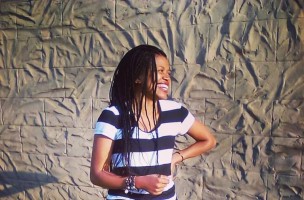 (Kenya) because of my young family. I have always been interested in people and studied Anthropology for my undergraduate degree at the University of Pittsburgh, USA (shout-out to Pitt and the Nelson Mandela Foundation for making it happen). I was also Pre-Med but chose public health over medicine for my Masters. I chose public health for the lifestyle and the fact that it would involve me more in who people were, and not just their physical health. It was still a hard choice between medical anthropology and public health, but I got interested in some of the scientific aspects of the latter and chose Epidemiology for my Masters (at Moi University in Kenya). Epidemiology brought me to an interest in maternal health, particularly methods for attributing health outcomes to interventions while taking a life-cycle or life-course perspective. So I decided to come back home and register for a PhD in Public Health in order to dive deeper. I developed a proposal on holistically assessing the maternal continuum of care and its relationship with maternal health trajectories (Here shout-out to the National Research Foundation’s SARChI in Health Systems Governance, Complexity and Social Change for the opportunity). I am now in my third year of studies at the University of the Western Cape School of Public Health, loving my research but trying to figure what the plan is after this.
(Kenya) because of my young family. I have always been interested in people and studied Anthropology for my undergraduate degree at the University of Pittsburgh, USA (shout-out to Pitt and the Nelson Mandela Foundation for making it happen). I was also Pre-Med but chose public health over medicine for my Masters. I chose public health for the lifestyle and the fact that it would involve me more in who people were, and not just their physical health. It was still a hard choice between medical anthropology and public health, but I got interested in some of the scientific aspects of the latter and chose Epidemiology for my Masters (at Moi University in Kenya). Epidemiology brought me to an interest in maternal health, particularly methods for attributing health outcomes to interventions while taking a life-cycle or life-course perspective. So I decided to come back home and register for a PhD in Public Health in order to dive deeper. I developed a proposal on holistically assessing the maternal continuum of care and its relationship with maternal health trajectories (Here shout-out to the National Research Foundation’s SARChI in Health Systems Governance, Complexity and Social Change for the opportunity). I am now in my third year of studies at the University of the Western Cape School of Public Health, loving my research but trying to figure what the plan is after this.
Mbuyi Moloi
 I am Mbuyiselwa Shadrack Moloi, better known as “Mbuyi”. I completed matric in 2012 and joined the University of the Free State, Qwaqwa campus, to pursue my studies in BSc Zoology. I went straight for my honours degree after that, and at the moment, I am starting my Master’s degree in Zoology. When I am not burying my face in books, I do transformational facilitation, youth coaching, mentoring other young people and I occasionally deliver motivational talks in local schools. One thing close to my heart is youth and community development. I achieve this through encouraging other young people to get themselves educated. Because I do not just preach this gospel, that is why I am also pursuing an MSc degree because education is my passion and science is closest to my heart. I tweet under the handle @juniormoloi
I am Mbuyiselwa Shadrack Moloi, better known as “Mbuyi”. I completed matric in 2012 and joined the University of the Free State, Qwaqwa campus, to pursue my studies in BSc Zoology. I went straight for my honours degree after that, and at the moment, I am starting my Master’s degree in Zoology. When I am not burying my face in books, I do transformational facilitation, youth coaching, mentoring other young people and I occasionally deliver motivational talks in local schools. One thing close to my heart is youth and community development. I achieve this through encouraging other young people to get themselves educated. Because I do not just preach this gospel, that is why I am also pursuing an MSc degree because education is my passion and science is closest to my heart. I tweet under the handle @juniormoloi
Darryl Heron
I am a huge fan of stories. It doesn’t matter if the story has been captured in a book, shot  on film or delivered on stage, as long as it is captivating. My love for stories and the inspiration they gave me got me –partly– into a career in science. One of the reasons I am here, working toward a PhD in microbiology, is because of the 1995 movie Outbreak, starring Dustin Hoffman and Morgan Freeman. The story, although fictitious, did give me a little insight into how devastating a pathogen can be. While I didn’t end up battling the deadly Motaba virus, I did use my talents to work on another important pathogen (of pine), a fungus called Fusarium circinatum. During my MSc, I worked with a number of important Fusarium species, eventually describing some of them. When an MSc wasn’t enough, I moved onto a PhD where I now study the potentially harmful Fusarium occurring on grass beneath diseased pine trees. I hope to gain a better understanding of the role alternative plant species play in the biology and distribution of various devastating Fusarium species, like Fusarium circinatum. The only thing I love more than stories and science is being able to tell some of my own stories. During my postgraduate career, I have been learning to communicate science better. I want to use my storytelling through comics, blogs, posters and popular science pieces to make many more people fans of science. You can follow me on Twitter @LTranslat3d or look for my Facebook page, Loosely Translated.
on film or delivered on stage, as long as it is captivating. My love for stories and the inspiration they gave me got me –partly– into a career in science. One of the reasons I am here, working toward a PhD in microbiology, is because of the 1995 movie Outbreak, starring Dustin Hoffman and Morgan Freeman. The story, although fictitious, did give me a little insight into how devastating a pathogen can be. While I didn’t end up battling the deadly Motaba virus, I did use my talents to work on another important pathogen (of pine), a fungus called Fusarium circinatum. During my MSc, I worked with a number of important Fusarium species, eventually describing some of them. When an MSc wasn’t enough, I moved onto a PhD where I now study the potentially harmful Fusarium occurring on grass beneath diseased pine trees. I hope to gain a better understanding of the role alternative plant species play in the biology and distribution of various devastating Fusarium species, like Fusarium circinatum. The only thing I love more than stories and science is being able to tell some of my own stories. During my postgraduate career, I have been learning to communicate science better. I want to use my storytelling through comics, blogs, posters and popular science pieces to make many more people fans of science. You can follow me on Twitter @LTranslat3d or look for my Facebook page, Loosely Translated.
Davide Gaglio
 I was born and raised on an Island (Sicily) in the middle of the Mediterranean Sea and I’ve always lived along the shore. I have worked for many years for WWF and in those years I have been lucky enough to be involved with many projects related to the marine environment. In 2009, I moved to Australia to face the Ocean for the first time. In that moment, I realised that despite my great passion and knowledge of the marine ecosystem, there was much more for me to discover.
I was born and raised on an Island (Sicily) in the middle of the Mediterranean Sea and I’ve always lived along the shore. I have worked for many years for WWF and in those years I have been lucky enough to be involved with many projects related to the marine environment. In 2009, I moved to Australia to face the Ocean for the first time. In that moment, I realised that despite my great passion and knowledge of the marine ecosystem, there was much more for me to discover.
In 2013, I started a research project at the Percy Fitzpatrick Institute of African Ornithology and University of Cape Town. The project started as MSc and I have recently upgraded to a PhD. My research focuses on the links between pelagic fish and seabirds. Thanks to this research, I’ve been living on remote islands for long periods of time, which has given me the opportunity to develop my interest in not only seabirds, but marine conservation as a whole. Ongoing efforts are needed to protect and preserve our marine ecosystems from being damaged and I strongly believe that public outreach has an important role to play in it.
Keafon Jumbam
 I was born and bred in Cameroon, West Africa, where I matriculated before travelling to South Africa to pursue undergraduate and postgraduate studies in Zoological Sciences. During my Honours degree, I was awarded a bursary to travel to the sub-Antarctic Marion Island and research on physiological responses to temperature changes of two of the island’s spider species. Mingling with the expedition team full of accomplished scientists greatly improved my research skills and helped me see the bigger picture: every living organism counts!
I was born and bred in Cameroon, West Africa, where I matriculated before travelling to South Africa to pursue undergraduate and postgraduate studies in Zoological Sciences. During my Honours degree, I was awarded a bursary to travel to the sub-Antarctic Marion Island and research on physiological responses to temperature changes of two of the island’s spider species. Mingling with the expedition team full of accomplished scientists greatly improved my research skills and helped me see the bigger picture: every living organism counts!
My MSc was a buildup on my physiological foundation: I investigated responses to heat traits, including climate change effects on distribution patterns of the invasive Argentine ant. And now for my PhD, I have moved to something much bigger than invertebrates – bat-eared foxes (aka batties). Batties are the only canids that feed almost exclusively on invertebrates. My focus is on maternal care and factors that contribute to stress levels in females, given that pregnancy and lactation are likely to increase nutritional needs. Therefore, exploring their feeding habits (amongst other things), is high up on the cards for me. Now that we’ve established that invertebrates are here to stay, a blend of entomological and mammalian research for a postdoc degree is the way forward for me.
Ruenda Loots
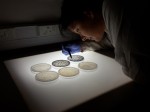 As a curious little girl, I pulled leaves apart to see how they worked, memorised Latin names of animals for fun and used my paintbrush to pollinate flowers. I’ve always been enthralled by Nature’s ingenuity, so pursuing a career in natural science seemed an obvious choice. After countless test papers, assignments and a Master’s thesis I needed a break! Science was wonderfully challenging but I struggled to see how I could use all the academic learning to make a difference. So I set out to find “meaning”. After a detour through Radio-ville, the journey led me to theSustainability Institute. Here I found the point where Science meets Purpose:biomimicry. Sometimes called “bio-inspired innovation,” biomimicry is an emerging scientific discipline that studies Nature’s design principles in order to find sustainable solutions for human challenges. This ‘a-ha’ moment motivated me to return to the laboratory where I now study the complex world of bacterial biofilms in order to contribute to our understanding of Life’s genius. And that’s how the curious little girl became a biomimetic biochemist with a passion for sustainability, environmental education and science communication.
As a curious little girl, I pulled leaves apart to see how they worked, memorised Latin names of animals for fun and used my paintbrush to pollinate flowers. I’ve always been enthralled by Nature’s ingenuity, so pursuing a career in natural science seemed an obvious choice. After countless test papers, assignments and a Master’s thesis I needed a break! Science was wonderfully challenging but I struggled to see how I could use all the academic learning to make a difference. So I set out to find “meaning”. After a detour through Radio-ville, the journey led me to theSustainability Institute. Here I found the point where Science meets Purpose:biomimicry. Sometimes called “bio-inspired innovation,” biomimicry is an emerging scientific discipline that studies Nature’s design principles in order to find sustainable solutions for human challenges. This ‘a-ha’ moment motivated me to return to the laboratory where I now study the complex world of bacterial biofilms in order to contribute to our understanding of Life’s genius. And that’s how the curious little girl became a biomimetic biochemist with a passion for sustainability, environmental education and science communication.
Yonela Zifikile Njisane
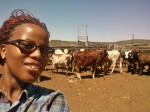 I am a PhD student at the University of Fort Hare, Alice, Eastern Cape. I was born into a big family and grew up in Flagstaff, a small rural town in the Eastern Cape, where I completed my early schooling. Straight after high school (in Harding, KZN) I enrolled at the University of Fort Hare where I obtained my BSc (2011) and MSc Agric (2013) degrees before launching into a PhD in Agriculture (Animal Science) at the same institution. My love for research, and eagerness to learn and strong belief in empowerment through education motivated my decision to start a PhD. For me, this is the only way to attain the greatness I have always dreamed and hoped to achieve for myself and my family. It is a legacy that can never be lost. My current research focuses on animal welfare and meat science, particularly beef cattle behaviour relating it to meat production. I am looking to further animal behaviour and welfare research, merging it with community engagement in a broader spectrum and different species around South Africa and Africa as a whole.
I am a PhD student at the University of Fort Hare, Alice, Eastern Cape. I was born into a big family and grew up in Flagstaff, a small rural town in the Eastern Cape, where I completed my early schooling. Straight after high school (in Harding, KZN) I enrolled at the University of Fort Hare where I obtained my BSc (2011) and MSc Agric (2013) degrees before launching into a PhD in Agriculture (Animal Science) at the same institution. My love for research, and eagerness to learn and strong belief in empowerment through education motivated my decision to start a PhD. For me, this is the only way to attain the greatness I have always dreamed and hoped to achieve for myself and my family. It is a legacy that can never be lost. My current research focuses on animal welfare and meat science, particularly beef cattle behaviour relating it to meat production. I am looking to further animal behaviour and welfare research, merging it with community engagement in a broader spectrum and different species around South Africa and Africa as a whole.
Sipho Patrick Mabusela
 I was born in Cape Town but raised in the eastern Cape, South Africa. As a child I moved around a lot so writing all those places might feel like reading a reference list [boring]. With all this moving you’d think I’d have a lot of friends, but to the contrary. As I young boy I’ve always had a fascination with dogs or just animals in general. Growing up with a hunting/ farmer dad I guess you’re more inclined to start having a relationship towards animals due to the exposure. My love for animals almost pushed me towards being a veterinarian but due to the number of years needed to complete the degree I decided against that. Instead I decided to do a BSc in Animal Science… After finishing my undergraduate degree, I was drawn to chickens. Weird right? Yeah, I know! From then onwards I decided what better way to embrace my animal calling then to focus my career towards Animal Nutrition. Specifically looking at mono-gastric animals (the ones with only one stomach chamber, like us); currently my research is on egg laying chickens, looking at the effect of non-conventional protein sources their performance and egg quality.
I was born in Cape Town but raised in the eastern Cape, South Africa. As a child I moved around a lot so writing all those places might feel like reading a reference list [boring]. With all this moving you’d think I’d have a lot of friends, but to the contrary. As I young boy I’ve always had a fascination with dogs or just animals in general. Growing up with a hunting/ farmer dad I guess you’re more inclined to start having a relationship towards animals due to the exposure. My love for animals almost pushed me towards being a veterinarian but due to the number of years needed to complete the degree I decided against that. Instead I decided to do a BSc in Animal Science… After finishing my undergraduate degree, I was drawn to chickens. Weird right? Yeah, I know! From then onwards I decided what better way to embrace my animal calling then to focus my career towards Animal Nutrition. Specifically looking at mono-gastric animals (the ones with only one stomach chamber, like us); currently my research is on egg laying chickens, looking at the effect of non-conventional protein sources their performance and egg quality.
Simone Richardson 
I am a PhD candidate in virology specialising in HIV that keeps sane with cartooning and cracking punny jokes. I am currently working on the hunt for HIV vaccines while occasionally wearing a HAZMAT suit which raises my science street ‘cred’ considerably. I enjoy growing viruses, infecting cells and then finding complicated ways of killing them, all the while practicing my evil laugh. I do not have spare time as I am doing a PhD; ask me again in 3 years. I blog, therefore I am.
Joey Hulbert
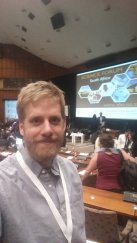 Joey is a PhD student at the University of Pretoria supported by the Forestry and Agricultural Biotechnology Institute. He is passionate about science communication and engaging the public in science. He aspires to inspire scientific inquiry in our youth while making a positive impact on the planet through research about plant diseases and outreach about microorganisms as the cause of disease. For Joey’s PhD, he is initiating a citizen science program to engage the public in research about plant destroyers in the Western Cape. For more information about the project, visit http://citsci.co.za
Joey is a PhD student at the University of Pretoria supported by the Forestry and Agricultural Biotechnology Institute. He is passionate about science communication and engaging the public in science. He aspires to inspire scientific inquiry in our youth while making a positive impact on the planet through research about plant diseases and outreach about microorganisms as the cause of disease. For Joey’s PhD, he is initiating a citizen science program to engage the public in research about plant destroyers in the Western Cape. For more information about the project, visit http://citsci.co.za
Odilile PL Ayodele
 I have always been interested in how culture and context intersect and affect every part of human interaction. I was born to a South African mother and Nigerian father and learned practical ‘diplomacy 101’ within my extended family. I am currently finishing up my doctoral studies with the SARChi Chair for African Diplomacy and Foreign Policy at the University of Johannesburg. I am a pilot’s wife and have two small children.
I have always been interested in how culture and context intersect and affect every part of human interaction. I was born to a South African mother and Nigerian father and learned practical ‘diplomacy 101’ within my extended family. I am currently finishing up my doctoral studies with the SARChi Chair for African Diplomacy and Foreign Policy at the University of Johannesburg. I am a pilot’s wife and have two small children.
My journey to my doctorate isn’t the most conventional: I earned a Masters degree in International Relations from WITS, I went to work (because that is what was expected from me) then decided to be a stay-at-home mum (not so expected) while I reimagined what I wanted my future to look like. Unlike, many of my colleagues, I undertook the PhD not for prestige, or to begin the arduous journey towards the increasingly elusive tenured position, but rather to redirect my path and gain a new set of skills. This journey has given me a lot more in my professional and personal life than I could have ever imagined; I am definitely not the same person coming out that I was going in.
Itumeleng Moroenyane
 I was born and schooled in Gauteng, and I completed my BSc (plant ecology) at the University of Cape Town. I took a ‘travelling’ break after my BSc, it was during my travels that I felt the lure of academia. At that time, I was living in Seoul and began my MSc (in microbial ecology) at Seoul National University. After my MSc I moved to Montréal, Canada where I am currently pursuing my Ph.D (microbial ecology) at Institut National de la Recherche Scientific (Centre-Institut Armand-Frappier).
I was born and schooled in Gauteng, and I completed my BSc (plant ecology) at the University of Cape Town. I took a ‘travelling’ break after my BSc, it was during my travels that I felt the lure of academia. At that time, I was living in Seoul and began my MSc (in microbial ecology) at Seoul National University. After my MSc I moved to Montréal, Canada where I am currently pursuing my Ph.D (microbial ecology) at Institut National de la Recherche Scientific (Centre-Institut Armand-Frappier).
Briefly- I am a microbial community ecologist with a keen interest in testing ecological theories of community assembly; particularly, incorporating phylogenies in community assembly analysis. I have a firm background and deep understanding of Mediterranean ecosystems and ecological theory. My current Ph.D. work focuses on understanding which assembly processes are delimiting the plant microbiome, as well as the evolutionary history of niche shifts and stability. My work will contribute to our understanding of how plant microbiomes are assembled and maintained; more importantly, it will offer a new perspective on the hologenome theory of evolution. I am also passionate about science communication and an active contributor to online discussions regarding advances and challenges in microbiome research.
Sipokazi Nyeleka
 I was born in the Eastern Cape and I’ve lived there all my life. Though I was born first I can never really claim to be the “first born” because I share my birthday with my twin sister. I love reading. And no, I don’t mean pdf files and journal articles — I mean novels and autobiographies. I also love being outdoors and so I do road runs and fit in tennis here and there.
I was born in the Eastern Cape and I’ve lived there all my life. Though I was born first I can never really claim to be the “first born” because I share my birthday with my twin sister. I love reading. And no, I don’t mean pdf files and journal articles — I mean novels and autobiographies. I also love being outdoors and so I do road runs and fit in tennis here and there.
Broiler production is something close to my heart. I have experienced how it can help the people of a village (my village) gain their financial independence as well as food security, which happens to be a crisis in our continent. Hence I undertook a project that would give me the opportunity to help broiler producers. Currently I am a second-year Masters student, at the University of Fort Hare. My project focuses on the search for alternative protein sources that can be included in broiler diets. Never has it been so important to search for alternatives that will suit the various climatic conditions of our continent because the population is increasing, putting more pressure on broiler producers to increase production. The aim of course is for these alternatives to be affordable and sustainable.
I want to make the world a better place through research. And what better way than to delve in a field that fuels all fields — you see, everyone must eat and because of that someone must ensure sustainable production. I am a researcher in the making and yes the path is new and very interesting and so to remind my self – from time to time – of what I want to achieve in life I always “Think about it, speak about it, then I be about it!”
Mathapelo Seopela
I’m a Chemistry doctoral student at the Tshwane University of Technology. My study area deals with the chemistry of the environment, with particular focus on analytical detection and quantification of persistent organic pollutants. In addition, I assess the risk posed to aquatic systems by these contaminants. For the past few years, I’ve been involved in gender equality issues and currently serve on the Women in Science forum of the Faculty of Science. I strongly feel that the contribution of Africans to good quality and appropriate science will change the perceptions of researchers from other continents about Africa and her people. However, that contribution can only take place if we are equipped with world-class skills, particularly those centred around communication. Through my research, I aim to contribute to building science as well as improving our understanding regarding the sustainability of the environment. My passions include ecological preservation and restoration, participating in interdisciplinary partnerships, solutions into greener energy solutions, using environmentally friendly research methods, as well as involving community participation. I want to be a part of this promising future by developing relationships with my peers and undertaking research that contributes to the progress of science that encourages economic prosperity in Africa. Africa is never seen as a source of high-quality research and therefore I want to change this perception. As an upcoming female researcher and scientist, I believe that young scientists need to support one another to foster the development of human capacity and together contribute to the scientific community and the world.